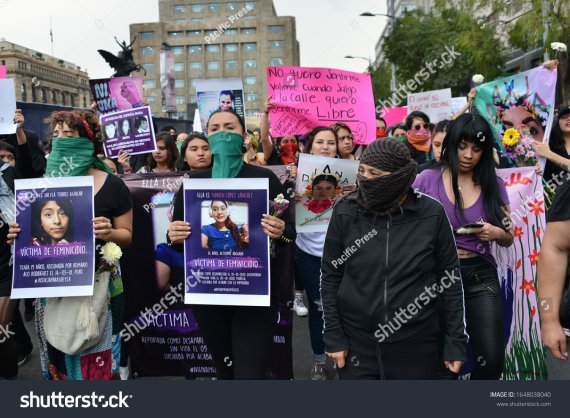The facts
Each day, 10 women are murdered in Mexico as a result of gender-based violence. In 2019, there were 10 per cent more femicides than the previous year. The national survey on sexual harassment showed that in the second half of 2019, 27 per cent of Mexican women were victims of sexual intimidation and 10 per cent were sexually abused. At some point in their lives, 66 per cent of women older than 15 have faced some form of violence. This is what is reported to the authorities; real figures are likely to be much higher.
The flawed justice system systematically fails to build a proper prosecution, loses key pieces of evidence and ultimately releases the suspects. Our society, media and authorities do not condemn or punish the perpetrators of such heinous hate crimes.
Women have protested against gender-based violence for years, only to be met with oppression and indifference. They protest in order to raise awareness of this reality, to demand justice and the end of the violence that women face in Mexico and Latin America. On 9 March, thousands of women participated in a nationwide Women’s Strike, to draw attention to the consequences of the absence of women in everyday life.
Gender-based violence knows no borders, race, religion, age or socio-economic status. Last November, the International Day for the Elimination of Violence against Women was observed around the world and demonstrations took place in Turkey, Spain, South Africa, Russia and France. In 2017, Romania, Northern Ireland and Hungary were the European countries with the highest rates of homicides by intimate partners, overwhelmingly committed by men against women.
The privilege
I acknowledge my privilege of being able to study in Wageningen, where nothing has happened to me. I have gone out on the streets, dressed however I want and I have not been harassed. I have gone out at night and returned home safely by myself. This is not something a woman living in Mexico today can say. It is not something all women can say. Is it something men can say?
The empathy
How do you feel when you read this? ‘And it’s not my fault, not where I was, not how I dressed.’ This is a line from ‘A Rapist in Your Path’, a powerful chant written by Las Tesis, a Chilean collective. Perhaps if you’re a woman, you can relate to this on some level. But if something doesn’t affect you personally, should you care?
I and all of the women close to me in Mexico have experienced some form of violence. I am lucky enough not to have been murdered. Therefore, I feel the need to speak on behalf of all of those whose lives were taken from them, on behalf of underage girls, racialized and marginalized women. I need to raise my voice respectfully and responsibly, with true facts and figures. I need to stand in solidarity with all the mothers, fathers, sisters, brothers and friends who have lost someone at the hands of the violent men who are still free, waiting for their next victim.
Do you think it is possible to empathize from your own position of privilege?
Andrea Rivera del Rio, PhD Candidate, AFSG Food Process Engineering
Ook een mening over een actuele WUR-kwestie? Stuur je bijdrage van maximaal 350 woorden naar resource@wur.nl onder vermelding van ‘ingezonden’.

 Foto: Shutterstock
Foto: Shutterstock